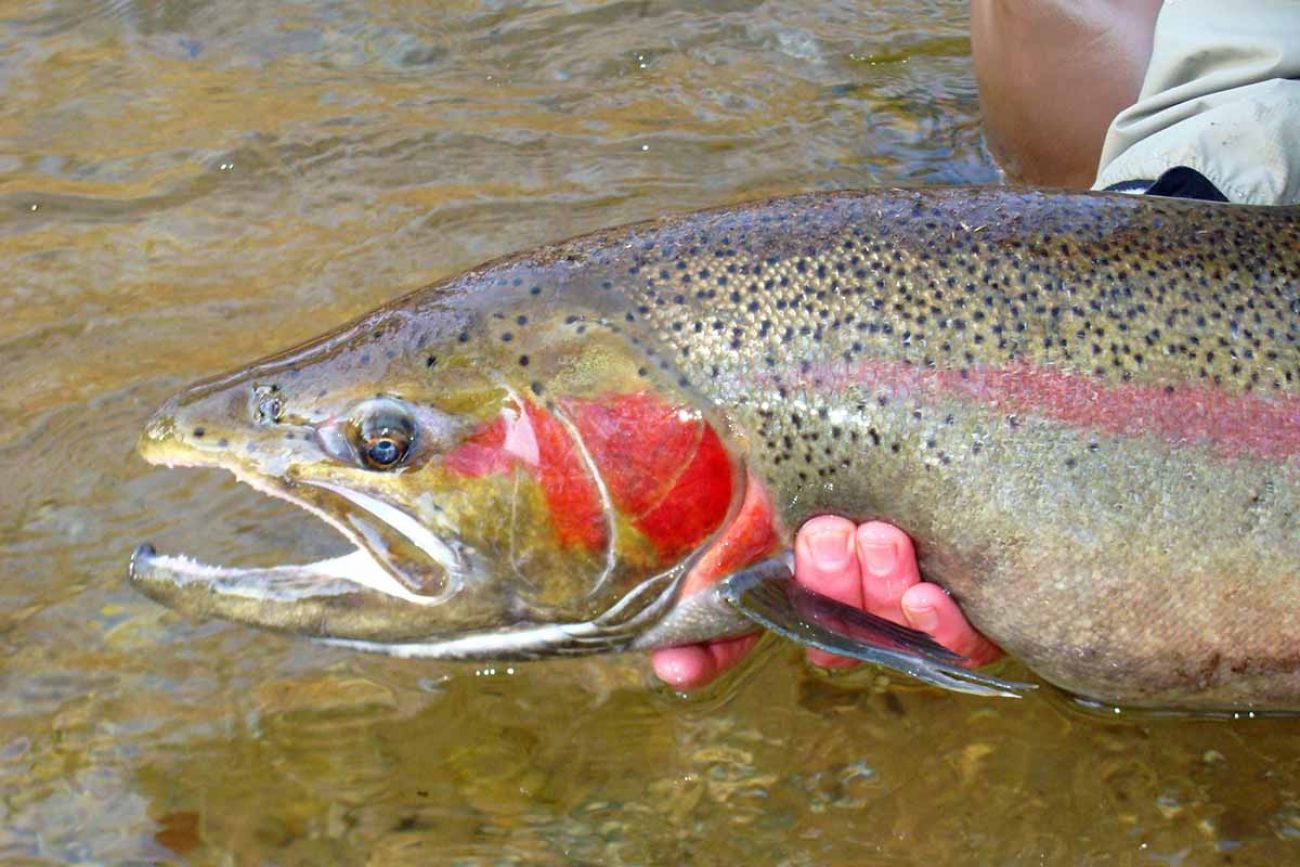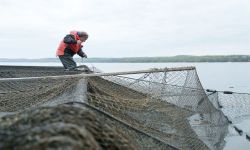Steelhead bag limits reduced in some Michigan waters amid fish declines

LANSING—The state Natural Resource Commission has reduced the steelhead daily bag limit from three to one during the spring spawning season in some Michigan tributaries with decreasing fish populations.
On Thursday, the commission unanimously approved NRC Commissioner David Nyberg’s amendment to a fishery order on bag limits to be proactive in addressing declining steelhead populations in Bear Creek, Manistee River, Pere Marquette, Muskegon River, Manistique River, and Carp River. The bag limit for prized game fish, which applies between March 15 and May 15, will go into effect Jan. 9.
The steelhead population in Lake Michigan has steadily declined from 3.5 million in 2011 to just under 3 million in 2018, according to the Department of Natural Resources. Steelhead populations at Little Manistee Weir dropped significantly from just over 6,000 in 2002 to just under 2,000 in 2020.
Related:
- Steelhead struggle in some Michigan waters. Will a catch limit help?
- Michigan wildlife official cries wolf. Gray wolf advocates want him gone.
- Record elk hunting applications fuel conservation efforts
But limiting anglers' catch opportunities may not be enough to support the state's struggling steelhead populations in some areas, according to biologists with the state’s Fisheries Division. Fisheries biologists say the decrease in fish correlates with increasing water clarity, a sign that the lakes lack the plankton and other small organisms that feed fish, and harsh spawning conditions.
The commissioners noted Nyberg’s amendment received ample feedback from the public, which influenced their decision to align with public support for tightening catch limits for the time being. Nyberg said he introduced the amendment to address the declining steelhead population while maintaining angler harvesting opportunities.
“This is a do-no-harm approach; something that can be done today,” Nyberg said. “While we don’t have a firm grasp as to why the steelhead population is declining, this is a proactive thing the commission can do.”
Public commenters at Thursday’s meeting included anglers and guides who said they were all in favor of reducing the steelhead bag limit during spawning season. Jay Allen owns the Muskegon River Inn, a hotel, coffee shop, and antique store in Newaygo that depends on the steelhead population. Allen expressed concern that without a reduced bag limit, the steelhead population could decline to dangerous levels and seriously impact his economic well being.
“The local businesses supported by steelhead is huge, not killing as many fish will help in the short term,” Allen said. “If we wait until there is an emergency, it will be too late, and the economy could crash.”
Fishing guides operating in West Michigan said the new regulations give spawning steelhead a break. Steve Pels, a guide at the Gates Au Sable Lodge, said reducing harvest is not the silver bullet that will fix the problem but gives the DNR time to figure out what is causing it.
“(Bag) limit reductions will not increase steelhead populations; however, it will have a net zero impact and would show the NRC’s commitment to addressing the problem,” Pels said.
Some guides want even stricter regulations surrounding steelhead harvest after observing the population's decline in recent years. Jeff Hubbard, a guide at Outfitters North Guide Service, said he believes reducing the daily bag limit year-round would prevent steelhead populations from declining to rates as low as those in the Pacific Northwest.
“A lot of the rivers in the Pacific Northwest are closing because they are not having steelhead return to their systems,” Hubbard said. “I have a lot of clients that are spending more time fishing with me because the rivers in British Columbia were shut down.”
Even as a modest step, Commissioner Tom Baird said the steelhead bag limit during its spawning season moves the NRC toward a longer-term solution that will increase its population.
“This is a small step,” Baird said. “If I had a magic wand, I would do a lot of things in addition to what we are proposing today, but I see this as an opportunity to take some pressure off (the fish), especially wild fish.”
In addition to reducing steelhead bag limits, two other orders were approved at the NRC meeting Thursday:
- A fishery order to keep Saginaw and Bay counties' walleye seasons open year-round beginning January 1, 2023
- An order to ban firearms in an open area in Benzie County, where, as Bridge Michigan previously reported, tensions had risen around increased shooting near residential areas
Michigan Environment Watch
Michigan Environment Watch examines how public policy, industry, and other factors interact with the state’s trove of natural resources.
- See full coverage
- Subscribe
- Share tips and questions with Bridge environment reporter Kelly House
Michigan Environment Watch is made possible by generous financial support from:
Our generous Environment Watch underwriters encourage Bridge Michigan readers to also support civic journalism by becoming Bridge members. Please consider joining today.
See what new members are saying about why they donated to Bridge Michigan:
- “In order for this information to be accurate and unbiased it must be underwritten by its readers, not by special interests.” - Larry S.
- “Not many other media sources report on the topics Bridge does.” - Susan B.
- “Your journalism is outstanding and rare these days.” - Mark S.
If you want to ensure the future of nonpartisan, nonprofit Michigan journalism, please become a member today. You, too, will be asked why you donated and maybe we'll feature your quote next time!






